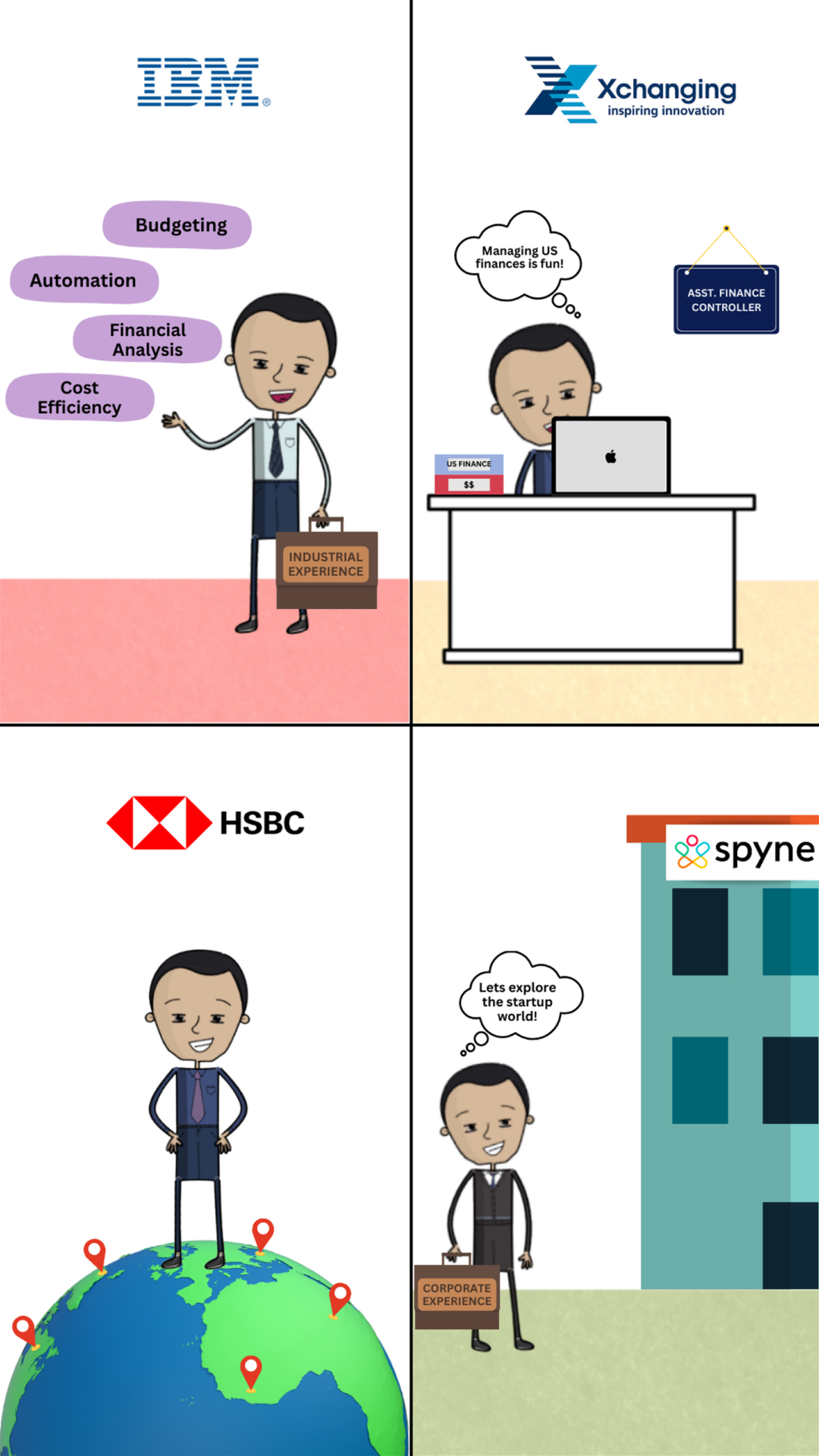How Aditya Singhal thrives in dynamic environments!
Intro
Aditya is a Chartered Accountant with over 20 years of experience. He has hands-on experience in both corporate as well as startup finance.
Career
- After obtaining his CA certification, Aditya started his industrial journey in 2002 with IBM. He helped IBM with its budgets, automation, cost efficiency, and financial analysis. That gave Aditya a neat experience of how MNCs worked, the pluses and minuses, and more importantly, the “industrial experience” of life.
- After working at IBM for 3 years, he then started working with Xchanging as an Assistant Finance Controller, where he would deal with the US finances. He continued to help Xchanging for 4 years. That’s where Aditya had his first lesson in controllership, which he really enjoyed doing.
- After a year of helping Symphony Teleca with its Operational Accounting, Aditya joined hands with HSBC India. He was there for more than 9 years, and he worked in many countries like Singapore, Hong Kong, and many others. That gave him a global perspective and the best practises worldwide, and it also gave him the experience of leading teams.
- After 18 years of corporate experience, he wanted to explore the startup world, wanted to challenge himself, and hence joined Spyne and currently heads its finance.
⭐
In his 20 years of career, he has made one point clear- there’s no age or time to do what you want to do.

About Spyne
Founded in 2018, Spyne helps businesses create high-quality product visuals at scale with AI. Spyne empowers car dealers and marketplaces to build consumer trust by creating engaging catalogues at scale within seconds.
When should a startup have a finance team?
Aditya explains how corporate finance and startup finance are at opposite ends of the spectrum. He tells us that, at a startup, finance is like a partner, and this function in a growing startup is more than just “compliance”. According to Aditya, startups must bring in a finance guy at the time of raising funds. The reason being that finance as a process isn’t just a “plugin-plugout” game. You have to change your mindset; you have to set up a process; you have to build a team; and you need to leverage the technology.
⭐
The reason being finance as a process isn’t just a ‘plugin-plug-out’ game.
What to look out for while outsourcing/appointing a consultant?
While appointing a consultant or outsourcing some finance tasks, Aditya majorly looks out for:
- the other person’s commitment level,
- their hunger to learn and get things done,
- their services and skillset, and
- their commercials
He says- until and unless someone’s services and commercials aren’t good enough, they cannot go a long way.
⭐
“Your services will get you opportunities, and your commercials will help you stay stable”.
How finance is managed?
At Spyne, Aditya, the head of finance, likes to have routine work related to business finance in-house. The reason for this is that these tasks necessitate a day-to-day understanding of what the business requires.
Besides this, he prefers to outsource compliance-related tasks such as GST, TDS, taxes, etc. The reason for this is that most of these tasks necessitate specialised knowledge.He also likes to outsource one-time tasks like TP studies.
What does our Finance Rockstar’s day look like?
Aditya’s days are very spontaneous, and nothing in his entire day can be predicted, and he loves that about startups Though there is an agenda or a “to-do” list, he says that more than half of the work he does is something he couldn’t predict at the start of the day!
He further tells us about his routine from his corporate days, and it turns out he could plan things quite far in advance. Whereas in a startup environment, he can predict only 30% of things around him, and the rest seems to be ad hoc.
Something memorable Aditya left us with
- He says, “when one works, they shouldn’t work for money. Instead, work for the experiences, work for the network, and work for the learning. Money will follow eventually”.
- Past experience comes only when we have opportunities. And opportunities will come only when we have experience. It’s like a loop but service companies trying to differentiate themselves must try to build both in parallel, and this can be done by networking!
- Until and unless someone’s services and commercials aren’t good enough, they cannot go a long way.





